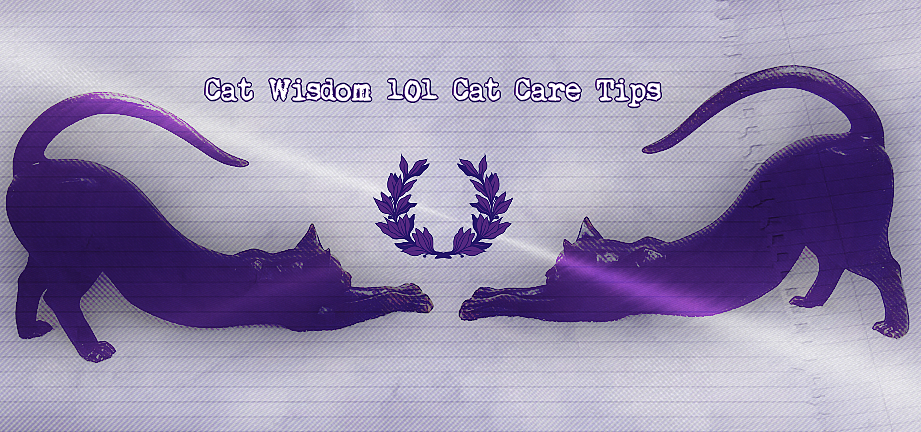Feline Hyperthyroidism 101 With Dr. Lorie Huston

This week, we’re delighted to have veterinarian Dr. Lorie Huston guest post for us again. Vet 101 Q & A will return next week. Vets are seeing an increase in feline hyperthyroidism in recent years. Find out what you need to know about this treatable disease.
Hyperthyroidism in Cats
Hyperthyroidism is a common disease in cats, particularly in older cats. It is caused by an over-active thyroid gland that is secreting an abnormally high level of thyroid hormone. It is the effect of these elevated thyroid hormones on the rest of the cat’s body that causes the symptoms seen.
Symptoms
The symptoms seen may be variable but include:
- Weight loss despite a good or even voracious appetite
- Vomiting
- Diarrhea
- Muscle wasting
- Heart disease/heart failure
- High blood pressure (hypertension)
- Blindness (resulting from hypertension)
Causes/Correlations
The exact cause of hyperthyroidism is still unknown. Here’s what we know.
- Cats with hyperthyroidism usually have a benign tumor in the thyroid gland that causes the excess secretion of thyroid hormone.
- Feeding canned food from “pop-top” cans has been correlated with an increased incidence of hyperthyroidism but not all cats that develop hyperthyroidism have been fed these types of foods.
- There has been some speculation that flame retardants (polybromated diphenyl ethers, PBDE) may have contributed to the increased incidence of hyperthyroidism. However, blood testing has failed to detect differing levels of the chemical in the blood of cats with and without hyperthyroidism.
- Additional theories speculate that other household chemicals could be responsible.
- Some people theorize that cats are simply liver longer today than previously. Because hyperthyroidism is primarily a disease of older cats, it’s possible that more cats are simply living long enough to develop the disease now.
- There is also some train of thought that hyperthyroidism is now a more commonly known disease than it was previously and that veterinarians are testing for it more often, leading to an increased number of diagnosed cats.
Diagnosis
The definitive test for hyperthyroidism is a blood test known as total T4. If the total T4 level is increased, the cat is hyperthyroid. However, sometimes blood levels are borderline and additional testing may be required. This additional testing may be a blood test known as free T4.
For most cats, a complete blood screen (which includes a complete blood cell count, blood chemistry profile and electrolyte levels) will be performed simultaneous with the total T4 measurement. This blood screen examines red and white blood cell values, liver enzymes, kidney function tests and electrolytes such as sodium, potassium, phosphorus and calcium.
If heart disease is suspected, radiographs (x-rays) of the chest and/or an echocardiogram (an ultrasound study of the heart) may be recommended.
Treatment
There are several treatment options available for feline hyperthyroidism.
- Methimazole (Tapazole, Felimazole) is a drug that is commonly used to treat hyperthyroidism. For most cats, this medication is relatively effective in controlling the signs of disease. However, the medication is not curative and cats treated with methimazole need to receive the drug for their entire lifetime.
- Radio-iodine therapy is a technique which uses a radioactive drug to destroy the unhealthy cells in the thyroid gland. This treatment is curative but it is not inexpensive and does require hospitalization in a specialized facility qualified to perform this type of treatment.
- Surgical removal of the thyroid gland is also possible and is still offered as a treatment option in some cases. However, radio-iodine treatment has largely replaced surgery as the treatment of choice when cure of the disease is desired.
- Hyperthyroidism can also be treated through the use of a specialized diet (Feline Y/D) that restricts the cat’s dietary iodine intake. It is important that only cats suffering from hyperthyroidism consume this diet. In healthy cats, this diet is not nutritionally complete and may lead to serious disease.
In some cases, hyperthyroid cats are started on methimazole as a preliminary treatment to observe their response to lowered thyroid hormone levels in the blood. Kidney disease can sometimes be masked by hyperthyroidism and symptoms of kidney disease sometimes become evident after treatment is instituted. If this is the case, methimazole can be discontinued temporarily or the dosage lowered to allow recovery.
Cats that do well on methimazole may go on to receive radio-iodine therapy if their owner elects a curative option. Cats treated with radio-iodine therapy will not require further administration of methimazole.
About Lorie Huston: Lorie is a veterinarian with over 20 years experience with dogs and cats. She currently practices at a busy urban practice in Providence, RI. Besides being a veterinarian, Lorie is a talented writer and blogger. You can learn more from Lorie about pet care at her blog, Pet Health Care Gazette, or find her at Lorie Huston.




17 Comments
John D.
is there any other kind of natural food that my Buzz can eat to improve his condition? We have the dry and wet Hills product but he doesn’t seem to either one.
michelle
I have a 20 year old cat with suspected Hyperthyroidism but I do not want to subject him to any testing of any kind because he is happy and seems content. I have owned many cats over the years and I do not see any signs of him slowing down or decreased quality of life. I did think about the pills but like my vet said they could bring out underlying Kidney or cardiac problems and like other people have posted it seems like the quality of life rapidly diminishes when started on treatment for a majority of these cats. My vet agreed with me that I was not going to vaccinate any more or bring him in to the vets as this alone is a huge stressor for him. Other than weight loss and some muscle wasting he really seems quite content. Is there any type of natural remedy just to decrease the thyroid count little bit or should I just leave him alone? I will also discuss this with my vet but am curious what others might do about this with an old but happy cat.Thanks so much.
boomermuse
Michelle, our vet does minimal testing on our geriatric cats and no vaccinations but they’ve all had geriatric panels to act as a baseline. There are natural thyroid remedies but their efficacy is anecdotal. Our philosophy if if it can’t hurt it’s worth a try.
Oui Oui
Very interesting. We haven’t had a cat with that – yet. We wonder what is it about pop top food?
Abby
Excellent article with very good information.
purrs
>^,,^<
♥Abby♥Boo♥Ping♥Jinx♥Grace♥
Brian
That was interesting info, we had no idea about it at all.
Karen G
CAUTION!!! please, if you are treating your cat with Methimazole, either in pill form or transderm gel, you MUST glove!! You MUST wash your hands!! My Harvey has been gone a year now and I handled methimazole in one form or another twice a day for 10 yrs. as a result MY thyroid all but shut down as a result of the exposure. After a year with ZERO exposure my thyroid is beginning to function again, but it has been difficult to say the least. The FDA did issue a warning about this a few yrs. ago (I still have it but would have to search for it) My Vet never saw this notice, my doctor never saw this notice until I presented it to them both. I used to get the medication at the regular pharmacy cuz it was cheaper that way, I asked the pharmacists WHY isn’t this warning included in the literature…his response was it is assumed the person handling the drug is the person taking the drug so there is no need to warn of handling. I said my prescription clearly says CAT!! He went pale before my eyes!!! PLEASE PLEASE PLEASE take every precaution to minimize your exposure. The drug is wonderful and will help your fur baby live longer, but at what cost?
boomermuse
Karen, thank-you so much for added valuable info.
Tamago
Thank you for the detailed information of this disease. My boys eat food from pop-top cans…I hope it’s not the part of causes.
Kathryn
Oh, so sad that Gris Gris has hyperthyroidism. I do feed our cats from pop tops.
I do hope our boys continue to stay okay…. Baby Food and luncheon meat are …. well somewhat fatty for them, but quite pure. And then the pop top cans..– oh dear…
Where do we find the flame retardants re: our cats lives? …
In other news, took in West Island the last couple of days. Bord du Lac… and pubs… Took 100 photos. Today, finishing the West side and tomorrow a tour of the East Side, and fantastic food.
Took several photos of Montreal West.
My sister has an absolutely gorgepous house in Pointe Claire.
Kristina
Thank you so much for posting this today!
I love your blog and read it every day…………… My husband and I have a multi-cat houshold, 6 to be exact…………
In any case our Samantha (Sammy)I noticed she was loosing weight so we got her to the vet last night……..and they think that this is what she has………..
we are waiting for the blood work results and will stake it from there.
thank you again so much for posting this.
sincerely,
Kristina
sue brandes
I guess I am lucky as my cat Squeaky has been on Methimazole pills for years and my vet says he looks and acts much younger than his 15yrs. He is doing very well. Really enjoyed this post as I did learn some new things about the disease and treatment.
Katie Isabella
My poor Admiral (Lady Bianca) was diagnosed later in her life and took her methimazole but her quality of life went significantly down. She passed away from hyper calcimia which she was diagnosed with a year later.
CATachresis
Thanks for the info. I’ve definitely heard of more incidences of hyperthyroidism in cats in the last few years.
Fuzzy Tales
Annie was hyper-t, and I regret not somehow borrowing the roughly $2K it would have taken to get the I-131 done in Ottawa (the nearest city that offered it). It’s not commonly done here, but goddess help me, if one of the boys ends up with hyper-t, I will move heaven and earth to get the treatment done. Annie was NEVER the same after she started on the methimazole, whether that was her own reaction to the drug or the disease or something else…or a combo. The hitch here in Canada is that cats have to remain isolated for a week to 10 days, I believe. Not the 3 to 5 days in most US states.
Kimberly
Very interesting article. My cat was just recenty diagnosed with hyperthyroidism, and has begun taking medication. This artcle gave me some good information on the whys and hows.
Kristina
Thank you so much for this very important information!
My husband and I maybe administering this med soon to our cat,
We are waiting for test results, so it is not a sure thing yet!
thx again